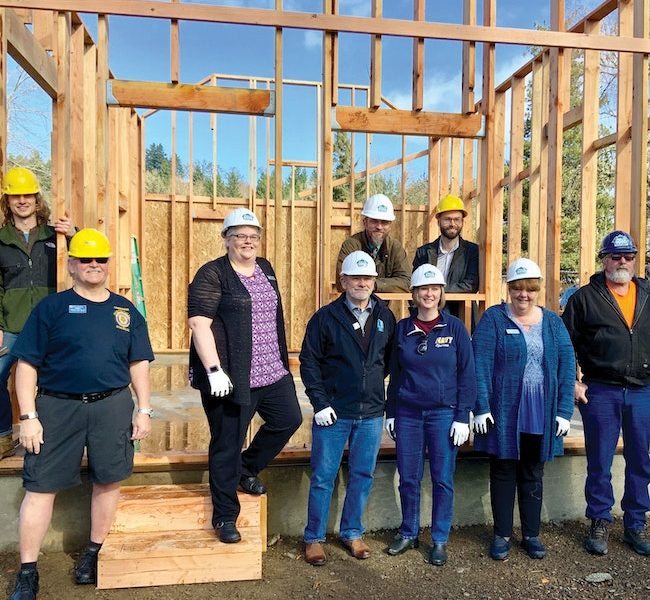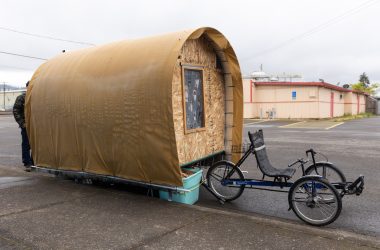 From left, front: American Legion Calvin Funk Post 32 commander Steven Wesolowski; Homes for Good Board appointed resident commissioner, Michelle Thurston; Pat Farr, Homes for Good and Lane County boards of commissioners; Heather Buch, Homes for Good Board commissioner and chair of the Lane County Board of Commissioners; Char Reavis, Homes for Good Board chair and Lane County Board of Commissioners member; an American Legion member; and an OregonBILDS student. Back row: an OregonBILDS student; Homes for Good executive director Jacob Fox; and UO OregonBILDS professor Jerolim Mladinov. PHOTOS PROVIDED/HOMES FOR GOOD
From left, front: American Legion Calvin Funk Post 32 commander Steven Wesolowski; Homes for Good Board appointed resident commissioner, Michelle Thurston; Pat Farr, Homes for Good and Lane County boards of commissioners; Heather Buch, Homes for Good Board commissioner and chair of the Lane County Board of Commissioners; Char Reavis, Homes for Good Board chair and Lane County Board of Commissioners member; an American Legion member; and an OregonBILDS student. Back row: an OregonBILDS student; Homes for Good executive director Jacob Fox; and UO OregonBILDS professor Jerolim Mladinov. PHOTOS PROVIDED/HOMES FOR GOOD
“It takes a village,” as the adage goes, to raise a child – and apparently, walls and roofs too. With its Legion Cottages project to provide affordable housing for local low-income and homeless veterans on track for summer completion, Cottage Grove is demonstrating what can be accomplished when government entities, organizations, agencies and programs collaborate to do good.
A “wall raising” ceremony on Feb. 24 celebrated construction of the first of four 400-square-foot homes – dubbed the Legion Cottages – being built on a 0.16-acre parcel adjacent to American Legion Calvin Funk Post 32.
It’s a project at the nexus of an impressive synchronicity, as Cottage Grove mayor Jeff Gowing’s vision of providing affordable housing for homeless veterans, Post 32’s desire to sell the land on condition that the cottages house veterans, and Lane County housing agency Homes for Good’s increasing focus on creating rural low-income housing all dovetailed neatly in timing and purpose.
The property’s location – behind Post 32 to facilitate resident veterans’ easy access to its camaraderie and services and across from Riverview Terrace, an affordable housing community already managed by Homes for Good that could share management, amenities and social activities – was also ideal.
It’s been said that when you’re on the right path, the universe winks and nods at you from time to time to let you know, and this project had the universe winking and nodding like crazy – and potential collaborators chorusing “yes” at every bend.
With Post 32 board approval, Gowing and city manager Richard Meyer invited Homes for Good to Cottage Grove “to assess whether affordable housing could be developed” on the property, said Homes for Good executive director Jacob Fox.
With its suitability determined, Homes for Good purchased the property, secured a $250,000 Lane County HIP grant, and reached out to Professor Rob Thallon, director of the OregonBILDS program at the UO.
The program had previously partnered with Homes for Good in building single-family homes to be sold as affordable housing, but the Legion Cottages project would step it up a notch, with students designing the tiny homes during one school term and constructing them – with contractor supervision – over the next two terms.
With OregonBILDS also on board, Meyers and Cottage Grove Public Works & Development director Faye Stewart met with Homes for Good and OregonBILDS representatives to hammer out development details, and construction began in January – with Post 32 providing electricity pending the installation of power poles.
“There’s a big need for veteran housing, especially lower-income veterans,” said post commander Steve Wesolowski. With improved access to a support network and services, “We’re hoping this gives (residents) a chance to better their lives.”
Inspired by a shared vision from the start, project partners are setting their sights even higher.
“Rural Lane County is facing an affordable housing crisis, and Homes for Good is stepping up our efforts to deliver housing solutions,” Fox said. The “unique and impactful” Legion Cottages project exemplifies how innovative thinking and cooperative effort can address that crisis, and it’s a model Fox hopes will spur similar developments in Cottage Grove and other rural areas of the County.
 The interior of one of the Legion Cottages under construction.
The interior of one of the Legion Cottages under construction.
Cottage Grove is ready to promote more such projects, Gowing indicated in his State of the City address in January. The speech coincided with Legion Cottages construction and the city council’s unanimous vote to amend development codes to allow increased variety in housing options, emphasizing low- to middle-income housing and supported by residential land use, development and housing density modifications.
The City’s Housing Development Cost Assistance Program provides system development and building fees relief to nonprofit and government housing developments.
“Over the last two years, (our) development process has streamlined to be one of the best programs in the state,” Gowing said.
Legion Cottages’ total cost is $550,000, provided primarily through grants, donations and loans, with $24,000 relief in system development and building fees from the City.
An opening date for applications has yet to be announced.








